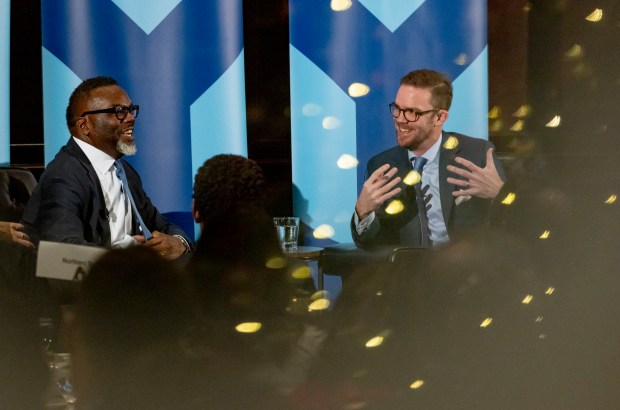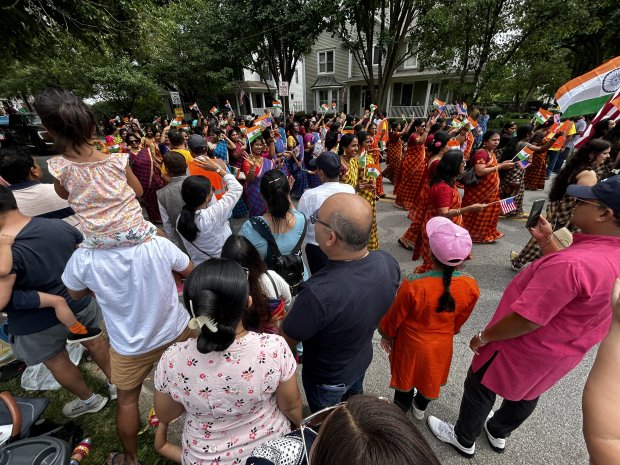Mayor Brandon Johnson on Tuesday debuted a new goal for Chicago: fewer than 500 homicides next year.
Johnson floated the benchmark — which has not been achieved since 2015 — during a City Club of Chicago speech, after noting this year’s drop in homicides and shootings. The mayor’s remarks to the lunch crowd of business types and politicos also leaned heavily on his racial identity and faith as he sought to recast the narrative on his rocky year-and-a-half leading the nation’s third-largest city.
Chicago homicides in 2024: 532 people slain. Here’s how that compares with previous years.
“Yes, we have work to do, but in 2025 we have the opportunity for the first time in over a decade to have less than 500 homicides,” Johnson said. “We have an opportunity for less life to be lost if we actually put in the hard work, roll up our sleeves, and not allow the narrative that comes from the outside to determine who we are as a city. … We are Chicago. We have come through some of the most treacherous times, and we have been trendsetters from our inception.”
The first-term mayor would repeatedly refer to his underdog brand in describing his tenure. He touted early legislative victories on progressive, pro-labor policies such as expanding mandatory paid time off for Chicago workers. He praised his administration’s work in beefing up the city’s youth summer jobs program, reopening mental health clinics and housing up to 15,000 migrants during the height of the asylum-seeker crisis.
But Johnson’s speech came during an unusually fraught budget season, one that saw him first delay the final vote on the spending plan from the beginning of November to this week — only to push back the date once again to mid-December as resistance from aldermen swelled. He brushed aside the concerns Tuesday by saying, “There has never been a more transparent and open process during this budget cycle.”
The event also took place amid ongoing controversy surrounding his former communications chief and longtime friend, Ronnie Reese. Questions from the City Club audience did not touch upon the accusations surrounding Reese’s alleged harassment, sexism, racism and other abusive behavior.
In his speech Johnson cracked jokes about the pressures of the office by noting his goatee had grayed, but he also stuck to his signature religious imagery to illustrate how he views the weight of his mayorship. He described himself as a “righteous man in office” and referenced a Bible verse on guiding young people when discussing his commitments to Chicago’s youth.
He again endorsed Chicago Bears CEO Kevin Warren’s nearly $5 billion plan to build a stadium on a revamped lakefront next to Soldier Field that would be partially taxpayer-funded. That bid has seen staunch resistance in Springfield, which would need to approve the package. But Johnson on Tuesday argued the $2 billion the franchise pledged to contribute would pay dividends for the city, which still owes outstanding debt on the current stadium.
“I’m not saying that I’m Jesus the Christ. I’m just saying that we have solved for a couple things,” the mayor said after his latest pitch for the proposal. “If you have a better plan than that, see my senior adviser, Jason Lee.”
The mayor repeatedly drew attention to his racial identity as well, declaring: “Now, I’m going to say something about our young Black men that many people are not accustomed to hearing: I love them. … We will not demonize all Black men.”
He also sought to connect his two political bases — progressive and Black voters — by sharing a story of his daughter Braedyn once informing him, “Dad, you’re triggering me.” Her use of “triggered,” a mental health term popularized over the recent decade to describe a response to past trauma, was brought up by Johnson as he touted his administration’s investments in mental health services, such as reopening three new clinics this year.
“There were times I had to fight to make sure I don’t lose my Black card. That was a tough one for me,” Johnson quipped. After the City Club moderator compared that dynamic to the mayor’s media interactions, Johnson added: “They certainly know I’m Black in the press.”
Meanwhile, the mayor’s objective of seeing fewer than 500 homicides comes as the city has seen a downward trend in gun violence since 2022. As of last week, 532 people were slain in the city in 2024. A total of 617 homicides were recorded through 2023.
Though this ongoing drop started before Johnson took office last year, the promising direction of the city’s crime statistics could present an achievable goal for him to claim progress when it comes to Chicago’s perennially stubborn gun violence epidemic. The last time Chicago recorded fewer than 500 homicides was 2015, at 493, according to city violence data.
Chicago in 2021 saw the highest number of shootings and homicides in a quarter-century as cities across the U.S. grappled with the fallout of the COVID-19 pandemic and the police murder of George Floyd. That spike in violence contributed to former Mayor Lori Lightfoot losing her run for a second term last year, though it is debatable among experts how effectively and swiftly a mayor can truly influence crime trends.
If Johnson was rattled by the headwinds, however, he did not show it as he told the City Club audience he intends to come back to speak for the next 20 years.
“It didn’t work, you all,” Johnson said as he closed his speech by taking a shot at his predecessors’ styles. “You know how I know? Because I’m here. If the other way worked, the city of Chicago would not have elected me. … Let’s do it another way. And let’s make sure that Braedyn can vote for me in 2031.”




